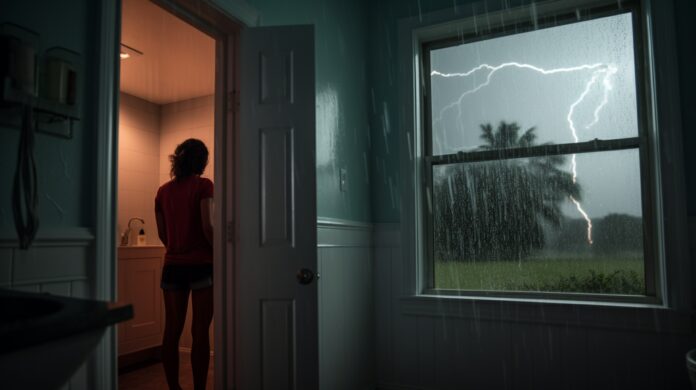Thunderstorms can be beautiful and awe-inspiring, but they can also be very dangerous.
Lightning is a major hazard associated with thunderstorms, and it can strike anywhere, even in urban areas.
One of the most common questions people have about lightning safety is whether or not it is safe to take a shower during a thunderstorm.
The short answer is no, it is not safe to take a shower during a lightning storm.
There are several reasons why it is not safe to take a shower during a lightning storm. First, lightning can travel through plumbing. If lightning strikes your home, it could travel through the plumbing and strike you while you are showering.
Second, water is a good conductor of electricity. This means that even if lightning does not directly strike your home, it could still travel through the water in the pipes and strike you.
Third, many homes have metal plumbing pipes. Metal is an even better conductor of electricity than water, so if you have metal plumbing pipes, your risk of being struck by lightning while showering is even higher.
In addition to the risk of being struck by lightning, there are other safety hazards associated with taking a shower during a thunderstorm.
For example, if lightning strikes your home, it could cause a power outage. This might cause the lights to go out leaving you in a dark bathroom and that might be a hazard for our older communities.
Here are some additional tips for staying safe during a thunderstorm:
- If you hear thunder, lightning is close enough to strike. Go inside immediately.
- If you are outside, seek shelter under a sturdy building or in a vehicle with the top up.
- Avoid standing under trees or near tall objects.
- If you are unable to find shelter, crouch down in a low-lying area with your feet together and your head tucked down.
- If you see someone who has been struck by lightning, call 911 immediately.
What else can you do to stay safe during a lightning storm?
In addition to avoiding water and seeking shelter, there are a few other things you can do to stay safe during a lightning storm:
- Unplug electronic devices. Lightning can travel through electrical cords and damage electronic devices. It is best to unplug all electronic devices, including computers, televisions, and phones, during a thunderstorm.
- Avoid using corded phones. Corded phones can be a hazard during a lightning storm because lightning can travel through the phone lines and strike you. If you need to use a phone during a thunderstorm, use a cordless phone or a cell phone.
- Stay away from windows and doors. Lightning can strike the outside of your home and travel through the windows and doors to the inside of your home. It is best to stay away from windows and doors during a thunderstorm.
- Be aware of your surroundings. If you are outside during a thunderstorm, be aware of your surroundings and avoid standing near tall objects, such as trees and power lines.
Here are some lightning facts from the National Oceanic and Atmospheric Administration (NOAA)
- Florida is the lightning capital of the U.S., averaging thunderstorms 70-100 days per year.
- In Florida on average, lightning kills 10 and injures 40 people per year.
- In the U.S. on average, lightning kills 93 and injures 300 per year.
- No place outside is safe from lightning.
- Most people are struck by lightning before it starts raining or after it stops raining.
- Lightning injures many more people than it kills and can cause permanent lifelong injuries.
- A lightning bolt can reach 54,000 degrees Fahrenheit, about five times hotter than the surface of our sun.
- Lightning strikes the United States 20 million times per year.
- Lightning moves about 30,000 times faster than a bullet.
- Thunder is the result of the rapid heating and expansion of air caused by a lightning flash.
- The average lightning flash could light up a 100-watt light bulb for three months.

By following these tips, you can help to protect yourself and your loved ones from lightning strikes.



